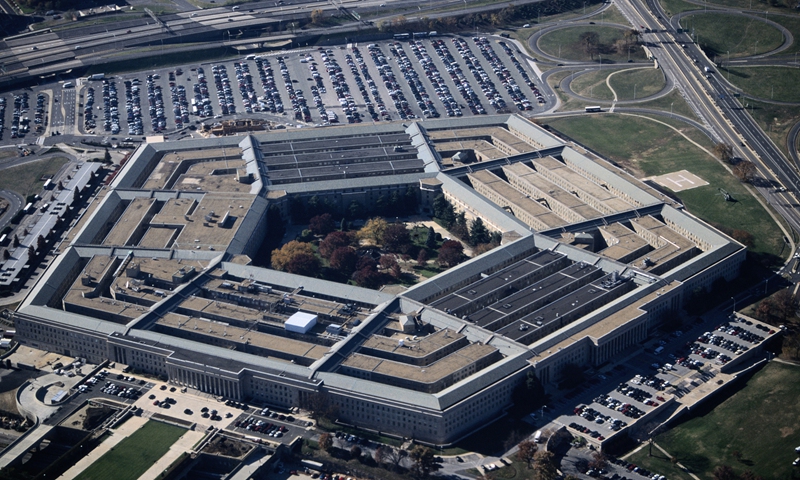
Pentagon File photo:VCG
Acting US Defense Secretary Chris Miller ordered a Pentagon-wide halt to cooperation with the transition of US president-elect Joe Biden, according to American news website Axios on Friday. The move has shocked officials across the Defense Department, Axios said.This is a very typical phenomenon of the US' current complicated domestic political situation. At present, the most complicated factor in US domestic politics is the possibility that Trump might not acknowledge the outcome of the election. Such controversy has not ended even after the electoral votes were officially counted and Biden was congratulated by Republican Senate majority-leader Mitch McConnell. This has brought great uncertainty to the transfer of power.
Miller said in a statement that after the "mutually-agreed upon holiday," "we will continue with the transition and rescheduled meetings from today." However, Biden's transition director Yohannes Abraham said, "Let me be clear: There was no mutually-agreed upon holiday break." Both sides hold their own words. This also shows that the Trump administration still wants to fight to the last minute about the election results. Therefore, the Pentagon's halt of transition can be seen as an extension of the current general election controversy.
On Friday, Abraham cited "constructive cooperation with many" federal agencies during the transition, but he also said they have met "isolated resistance" including from "political appointees" at the Pentagon. During the last few weeks of his tenure, Donald Trump has taken frequent actions against the Pentagon, dismissing several senior defense officials and planting some of his loyal followers in key positions.
Obviously, Trump has already affected the US' transition of power. From the very beginning, he did not initiate the transition on time. After the transition was initiated, Trump has still refused to accept the results. The process has already influenced the transition with tension.
The Biden team has warned that halting operations at the Pentagon may bring about national security risks. The Trump administration's various unreasonable acts include digging policy holes for Biden's team to contend with. This will indeed bring risks to the US, which can be divided into two aspects.
The first risk pertains to the US' national security itself. After all, the Pentagon is an important department which shoulders the responsibility of American national security. When power is smoothly transferred in the Pentagon, it ensures greater US national security.
Another risk relates to damages to US soft power. Following the 2020 presidential election, the shocking transition resistance and unexpected incidents at the Pentagon demonstrated a crisis of confidence in US democracy and with the American electoral system.
Such a crisis of confidence is not only coming from the American people, but also from the international community.
A US political civil war has truly seemed to have begun. The Pentagon's halt in the transition brings about certain risks to the US. It also shows that divisions have been greatly intensified in the country. Many people have been worried about whether an actual civil war will break out in the US. Some even say that a "cold civil war" has broken out. In fact, US domestic disputes were acute even before the election. The whole of American society is becoming increasingly divided on almost every public policy issue.
In this context, the election and the controversy brought by the election have taken American people's disputes to extremes. Such an extreme itself illustrates a political civil war. This will make the US face a crossroads of turning left or right. The US will only be able to clarify its further direction following more ups and downs. In this sense, the US could be said to be entering its third revolution. The first revolution was the internal revolution — the US Civil War of 1861-65. This ultimately propelled the country to embark on the path of capitalist modernization in industry and expansionism. A second revolution can be attributed to Franklin D. Roosevelt's New Deal. This ushered in a golden period of development for the US. Now, the US is facing the extreme opposition of turning left or right. This third revolution will determine the future direction of the country's development - of domestic retraction or positive global engagement with multilateralism.
The author is a senior research fellow at the China Institute of International Studies. opinion@globaltimes.com.cn
